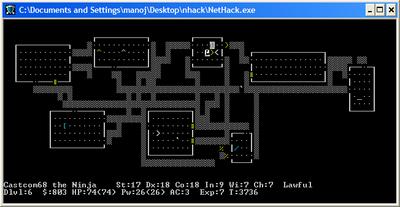- Awe. The skill with which the Performer played that beautiful Piano was outstanding - and it seemed all the more so to a worse-than-novice in music like me.
- A feeling that can be best described as "impossibility". While I *logically* understood that what I had witnessed was the natural consequence of the six plus hours(!) of practice put in by the performer each day for several years, to my mind it would always be impossible for *me* to ever do anything even remotely similar.
- Depression. Without much more explanation, let me just say that this usually follows points #1 and #2.
- "Giving up". After I recovered from #3, I gave up the whole line of thought and crawled back to my Dilbertain existence.
A few weeks later I started Piano lessons in Bangalore and later when my work took me to Dallas found an exceptionally good teacher here (more on this in a later post). After more than a year of taking lessons and after a (very very simple, bordering on trivial) recital of my own, I reconsidered that evening in Bangalore. In the light of my own lessons, I now have a different look at things.
All music lessons start (or are supposed to) with the basics. As the student progresses on this track, the teacher introduces a fairly simple stand alone piece to work on. When I saw my first such (an arrangement of Placide Clappeau's 'O Holy Night') I could instantly *see* that I could do it - with a little bit of effort. This was a perception different from a *logical understanding* - i.e., perceiving that I could do a task as opposed to understanding that anyone can do it by putting in suitable effort. The focus is on the doing - rather than on the quantum of effort. This is made possible because the quantum of effort involved is *small*.
My recital came and went in December 2004, and early this year, I got my next advanced piece (an Arrangement one of J.S. Bach's Musettes). Here was a piece which was complex than my Christmas piece and yet I was confident that I could do it - in another month or so, after due practice. What is important is that if I had been told that I could do it when I started the lessons or earlier, I would have balked at it and possibly have had thoughts listed in observations #1 through #4.
A similar incident occurred earlier this month. I picked up 4A though 5B of Carl Fischer's 'Music Pathways - Repertoire' series of books. My teacher kindly agreed to play examples from each book so that I could hear first hand what they would sound like when played correctly. Boy! The pieces were beautiful. And I was astounded to realize that these were within my grasp - given adequate work of course.
This is the beauty of taking lessons, reading simple pieces of music and practicing with simple goals in mind. What lessons did for me was to help focus on the task at hand and prevent my mind from being overwhelmed by looking only at the finest, the masterpieces. And this realization I call my 'Integration theory of Learning Music'.
The theory states that if Joe aspiring-Pianist (or Manoj aspiring-Pianist, if you will) wants to be able to delight himself by playing Bach one day, he needs to start with the basics and take small steps at a time. And if Joe a-P does not have the will to stick to a schedule on his own, he should find a good teacher and pay him/her to force Joe to take those steps. For when you start at level 0 and are shown level 1, you know you can do it. And at the end of level 1, level 2 is only a few hours/days/weeks or practice away. And so on. The tiny dx(Lesson/Step/Quantum) when integrated over time will yield the quantity that makes playing Bach, Mozart and Beethoven possible.



